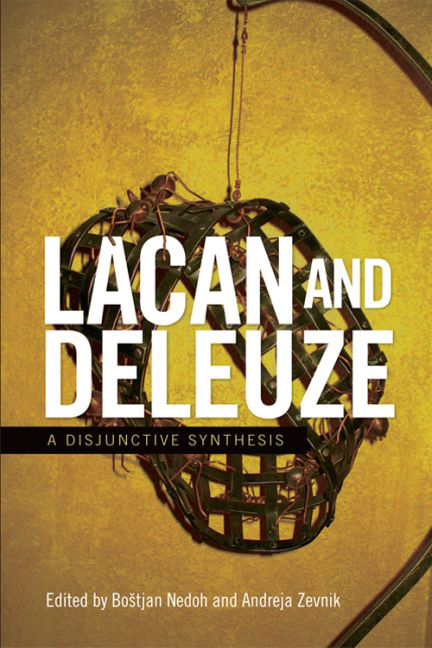Book contents
- Frontmatter
- Contents
- Acknowledgements
- Introduction: On a Disjunctive Synthesis between Lacan and Deleuze
- 1 For Another Lacan-Deleuze Encounter
- 2 Reciprocal Portrait of Jacques Lacan in Gilles Deleuze
- 3 Does the Body without Organs Have Any Sex at All? Lacan and Deleuze on Perversion and Sexual Difference
- 4 Gnomonology: Deleuze's Phobias and the Line of Flight between Speech and the Body
- 5 Lacan, Deleuze and the Politics of the Face
- 6 Denkwunderkeiten: On Deleuze, Schreber and Freud
- 7 Snark, Jabberwock, Poord'jeli: Deleuze and the Lacanian School on the Names-of-the-Father
- 8 Baroque Structuralism: Deleuze, Lacan and the Critique of Linguistics
- 9 Exalted Obscenity and the Lawyer of God: Lacan, Deleuze and the Baroque
- 10 The Death Drive
- 11 Repetition and Difference: Žižek, Deleuze and Lacanian Drives
- 12 Lacan, Deleuze and the Consequences of Formalism
- Notes on Contributors
- Index
10 - The Death Drive
Published online by Cambridge University Press: 20 April 2017
- Frontmatter
- Contents
- Acknowledgements
- Introduction: On a Disjunctive Synthesis between Lacan and Deleuze
- 1 For Another Lacan-Deleuze Encounter
- 2 Reciprocal Portrait of Jacques Lacan in Gilles Deleuze
- 3 Does the Body without Organs Have Any Sex at All? Lacan and Deleuze on Perversion and Sexual Difference
- 4 Gnomonology: Deleuze's Phobias and the Line of Flight between Speech and the Body
- 5 Lacan, Deleuze and the Politics of the Face
- 6 Denkwunderkeiten: On Deleuze, Schreber and Freud
- 7 Snark, Jabberwock, Poord'jeli: Deleuze and the Lacanian School on the Names-of-the-Father
- 8 Baroque Structuralism: Deleuze, Lacan and the Critique of Linguistics
- 9 Exalted Obscenity and the Lawyer of God: Lacan, Deleuze and the Baroque
- 10 The Death Drive
- 11 Repetition and Difference: Žižek, Deleuze and Lacanian Drives
- 12 Lacan, Deleuze and the Consequences of Formalism
- Notes on Contributors
- Index
Summary
In the beginning of his famous essay ‘Beyond the Pleasure Principle’ Freud introduces the problem of the compulsion to repeat, thus opening one of the most interesting as well as most controversial conceptual chapters in psychoanalysis, summed up by the hypothesis of the so-called death drive. Freud proposes a range of different examples. We come across people, he writes, all of whose human relationships have the same outcome: such as the benefactor who is abandoned in anger after a time by each of his protégés, however much they may otherwise differ from one another; or the man whose friendships all end in betrayal by his friend; or the man who time and again in the course of his life raises someone else to the position of great private or public authority and then, after a certain interval, himself upsets the authority and replaces him with a new one; or the lover each of whose love affairs passes through the same phases and reaches the same outcome. There is also the case that became notorious under the name of fort-da [gone-there] – the words used by a small child playing with a wooden reel with a piece string tied round it, repeatedly casting it away and puling it back to himself. Even more intriguing are the cases where the subject seems to have a passive experience, over which he has no influence, but in which he comes across the repetition of the same fatality. There was the case of the woman who married three successive husbands each of whom fell ill soon afterwards and had to be nursed by her on their deathbeds. Even at the level of dreams which are supposedly governed by the pleasure principle and guided by a ‘wish fulfilment’, psychoanalysis discovered a surprising compulsion to repeat some particularly traumatic incidents. The basic problem presented to psychoanalysis by the compulsion to repeat is thus the following: if one starts from – as Freud did at some point – the primary character of the pleasure principle which aims to or minimise displeasure, then the phenomena of the compulsion to repeat contradict this framework. Why would somebody be compelled to repeat a distinctly unpleasant experience?
Two divergent accounts of the mechanisms and the logics of the repetition can be discerned already in Freud.
- Type
- Chapter
- Information
- Lacan and DeleuzeA Disjunctive Synthesis, pp. 163 - 179Publisher: Edinburgh University PressPrint publication year: 2017



